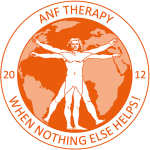“Pain affecting any part of your body for months or years is known as chronic pain.”
Pain is not only a symptom but an indicator that something is wrong with your body. However, a disease that presents no pain or chronic pain can be more dangerous than one accompanied by discomfort, as it may cause internal damage silently without warning signs. Chronic pain can be due to invisible inflammation which started decades ago in your body. It has a drastic impact on your body, both mentally and physically. Moreover, chronic pain can also affect your daily lifestyle activities such as walking, going to parties, and doing other stuff.
In this blog, we will discuss how to cope with chronic pain and how ANF Therapy®️ can help you manage chronic pai
Top 11 Ways to Cope with Chronic Pain:
The following are the top 10 strategies to cope with chronic pain:
1. ANF Therapy®️:
Amino neuro frequency therapy or ANF Therapy®️ is the newest treatment for coping with chronic pain. It helps people with chronic pain by targeting the real cause of the pain, not just the symptoms. It uses special devices that send signals to the body to support natural healing. These signals improve how the nervous system works, which helps reduce pain and inflammation. Many people notice improvements after one session, which makes it a great option for those who haven’t found lasting relief from other treatments.
If you are tired of taking traditional medications and your pain feels like an endless uphill battle, ANF Therapy®️ can be the best solution for relieving chronic pain.
How Does It Work?
ANF Therapy®️ uses small circular ANF Devices emitting specific frequencies to interact with the body’s nervous system. These frequencies help improve cell communication, reduce inflammation, and activate the body’s natural healing process. The devices are applied to certain body parts after a careful assessment by a trained ANF Therapist and are activated by the body’s heat. ANF Therapy®️ aims to address pain and inflammation at the cellular level to provide long-term recovery.
2. Hydration:
Hydration is essential because it boosts your healing process. According to Dr Mikel H-G Hoff, when you are dehydrated, your muscles and body take longer than usual to heal—delayed healing results in chronic pain and inflammation. Therefore, keep yourself hydrated to reduce the risk of chronic pain and other diseases.
3. Avoid stress:
4. Stop drinking alcohol:
Heavy alcohol consumption contributes to systemic inflammation and nerve damage, thus increasing your body’s sensitivity towards pain. Moreover, alcohol can dehydrate your body and deplete antioxidants. By stopping drinking alcohol, you can reduce the risk of chronic pain.
5. Practice breathing exercises:
Practice breathing through your nose. This allows your belly to expand and exhale from your mouth, decreasing your body’s sensitivity to pain.
6. Practice good sleep habits:
Sleep is as crucial for you as food is. During sleep, your body releases melatonin, which boosts your body’s healing process. Therefore, interrupted sleep decreases the body’s natural healing ability and increases pain sensitivity. Melatonin deficiency is one of the reasons for lack of sleep and insomnia. ANF Therapy®️ uses melatonin devices to regulate melatonin levels and induce natural sleep.
7. Stop Smoking:
Smoking restricts the blood flow to your muscles, which increases the sensitivity of chronic pain. It has certain toxins that increase the levels of free radicals and reduce antioxidants, leading to oxidative stress. Quitting smoking can help you cope with chronic pain. Moreover, if your body has low levels of antioxidants, ANF Therapy®️ can help replenish antioxidants naturally. Carnosine, glutathione, and melatonin devices can effectively detox your body.
8. Massage:
Massage increases blood circulation, releases endorphins (your body’s natural painkillers), and interrupts the pain cycle. It also helps decrease muscle tension. ANF nitric oxide devices aim to increase the blood flow in affected body areas.
9. Eat healthy diet:
A healthy diet can reduce your risk of chronic pain. Anti-inflammatory foods such as fruits, vegetables, whole grains, and healthy fats can reduce your body’s chronic inflammation.
10. Healthy Lifestyle:
A healthy lifestyle can significantly enhance your ability to cope with chronic pain, especially when combined with ANF Therapy®️. Regular physical activity improves circulation, strengthens muscles, and releases endorphins, naturally reducing pain. When paired with ANF Therapy®️, healthy lifestyle choices can create a powerful impact on your body.
11. Emotional support:
You don’t have to go through this alone. Living with ongoing discomfort can lead to feelings of frustration, anxiety, and depression, which often worsen the perception of pain. Share your feelings with your family, friends, or support groups to stay relaxed and stress-free.
Chronic Pain Treatment with ANF Therapy®️:
Chronic pain treatment with ANF Therapy®️ involves the following steps:
1. History
Your ANF Therapist will begin by taking a detailed medical history. This includes assessing the severity of your pain, sleep issues, and fatigue and reviewing any previous treatments and other medical conditions. This will help your therapist determine the root cause of your pain.
2. Physical Examination
The physical exam will identify muscle tenderness, nerve sensitivity, and trigger points. Your therapist will also assess your posture and range of motion to understand the extent of your chronic pain.
3. Application of ANF Devices
After the history and physical examination, your therapist will apply specific ANF Devices to your body. These may include anti-inflammatory devices, antioxidant devices (such as glutathione and carnosine), energy devices, and nitric oxide devices, all designed to support various systems in your body.
4. Expected Outcome
According to Dr Mikel H-G Hoff, most patients experience significant pain reduction after their first session, often seeing about 50% improvement. Symptom relief continues with further sessions.
5. Follow-Up
Regular follow-ups are crucial to monitoring your progress and adjusting your treatment plan. Your therapist will guide you in changing ANF Devices every 72 hours. Depending on your condition and response to therapy, the complete treatment may span 2 to 6 months.
Start your journey with ANF Therapy®️:
ANF Therapy®️ is the newest treatment for managing chronic pain. If you have chronic pain due to any underlying disease, consult an ANF Practitioner or find an ANF Therapist to start your treatment with ANF Therapy®️ today!
If you’re a healthcare practitioner and want to enhance your clinical skills with frequency medicine, learn more about the ANF Therapy®️ and ANF Clinical education program by visiting www.anfacademy.com








